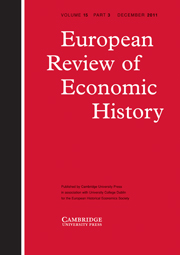Article contents
Chemicals, strategy, and tariffs: Tariff policy and the soda industry in Imperial Germany
Published online by Cambridge University Press: 02 January 2001
Abstract
Before 1880, the British soda industry dominated world export markets and held a substantial share of the German domestic market. After 1880, the German soda industry displaced British imports and then became a leading exporter. We investigate the contribution to these developments of German tariffs, particularly the decline in tariffs on soda in 1873 and the increase in 1880. We develop a model, based on developments in the ‘new trade theory’, of oligopolistic competition in the German soda market, we calibrate this model using historical data, and we then apply the calibrated model in simulating the effects of counterfactual tariff rates. Results show that the 1880 tariff increase promoted, but was not decisive for, the rise of the German industry. More important were the decline in German input prices and the shift to the ammonia process for producing soda.
- Type
- Research Article
- Information
- Copyright
- © 2000 Cambridge University Press
- 3
- Cited by


